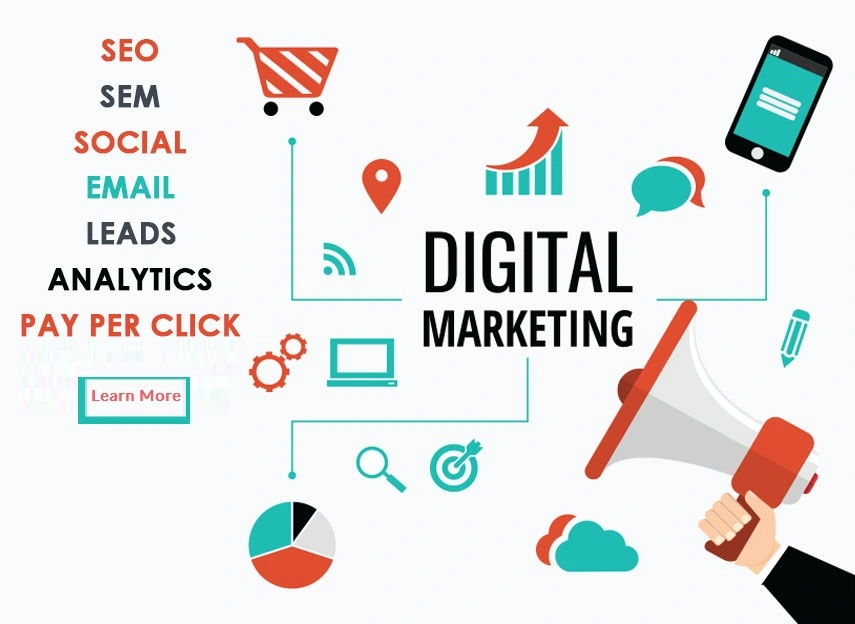In today’s digital age, marketing has undergone a significant transformation with a strong focus on online platforms. Digital marketing provides businesses with numerous opportunities to reach their target audience effectively and achieve their marketing goals. That is why we have come up with this article called – Digital Marketing for Beginners.
However, for beginners, navigating the world of digital marketing can be overwhelming. This comprehensive guide aims to provide you with a step-by-step overview of essential concepts, strategies, and tools. That will help you kickstart your digital marketing journey in 2023.
Understanding Digital Marketing
Digital marketing for beginners refers to the practice of promoting products or services using digital channels. Such as search engines, social media, email, content marketing, etc.
Its importance lies in the fact that the majority of consumers are now online, making digital marketing an integral part of any successful marketing strategy. By leveraging digital channels, businesses can engage with their audience, and drive traffic to their websites. Also ultimately generates leads and sales.
Core Digital Marketing Channels
1. Search Engine Optimization (SEO) – Understand the basics of SEO, including keyword research, on-page optimization, and link-building techniques, to improve website visibility on search engine result pages.
2. Pay-Per-Click (PPC) Advertising – Discover the world of PPC advertising, including platforms like Google Ads, and learn how to create targeted ad campaigns to drive traffic and conversions.
3. Social Media Marketing (SMM) – Explore the power of social media platforms such as Facebook, Instagram, Twitter, and LinkedIn, and learn how to create engaging content, build a community, and drive brand awareness and engagement.
4. Email Marketing – Understand the fundamentals of email marketing, including building an email list, crafting effective campaigns, and utilizing automation to nurture leads and retain customers.
5. Content Marketing – Learn the art of creating valuable and relevant content to attract and engage your target audience, establish thought leadership, and drive organic traffic to your website.
Building an Effective Digital Marketing Strategy
1. Defining Goals and Objectives – Set clear and measurable goals for your digital marketing efforts, such as increasing website traffic, generating leads, or boosting sales.
2. Identifying Target Audience – Understand your target audience’s demographics, interests, and pain points to tailor your marketing messages and campaigns effectively.
3. Conducting Market Research – Research your industry, competitors, and target audience to identify trends, opportunities, and potential gaps in the market.
4. Creating Buyer Personas – Develop detailed buyer personas to represent your ideal customers and personalize your marketing strategies to resonate with them.
5. Crafting a Unique Selling Proposition (USP) – Identify and communicate your unique selling proposition to differentiate yourself from competitors and appeal to your target audience.
6. Choosing the Right Digital Channels – Select the digital channels that align with your target audience’s preferences and behavior to maximize your reach and engagement.
Essential Tools for Digital Marketing
1. Analytics and Tracking Tools – Utilize tools like Google Analytics to monitor website performance, track user behavior, and gain insights for data-driven decision-making.
2. Social Media Management Tools – Streamline your social media efforts with tools like Hootsuite or Buffer to schedule posts, monitor engagement, and analyze results.
3. Email Marketing Platforms – Leverage email marketing platforms such as Mailchimp or Constant Contact to create and automate email campaigns, track metrics, and segment your audience.
4. SEO and Keyword Research Tools – Use tools like SEMrush or Moz for keyword research, on-page optimization, backlink analysis, and tracking your search engine rankings.
5. Content Management Systems (CMS) – Simplify content creation and management with CMS platforms like WordPress or Wix, enabling you to publish and optimize your content seamlessly.
6. Customer Relationship Management (CRM) Software – Implement CRM software such as HubSpot or Salesforce to manage customer interactions, track leads, and enhance the overall customer experience.
Measuring Digital Marketing Success
1. Key Performance Indicators (KPIs) – Define and track relevant KPIs such as website traffic, conversions, click-through rates, social media engagement, and email open rates.
2. Tracking Website Traffic and Conversions – Set up website tracking using tools like Google Analytics to monitor traffic sources, user behavior, and conversion rates.
3. Analyzing Social Media Engagement – Measure your social media performance through metrics such as likes, shares, comments, reach, and follower growth.
4. Monitoring Email Campaign Metrics – Analyze email campaign metrics like open rates, click-through rates, unsubscribe rates, and conversions to optimize your email marketing efforts.
5. Utilizing A/B Testing – Experiment with A/B testing to compare different variations of your marketing assets, such as landing pages or email subject lines, to optimize their performance.
Staying Up-to-Date with the Trends in the Digital Marketing field for beginners
1. Voice Search and Conversational AI – Stay informed about the growing impact of voice search and conversational AI on SEO and then, adapt your strategies accordingly.
2. Artificial Intelligence (AI) and Machine Learning (ML) – Keep up with AI and ML advancements that can enhance personalization, automation, and predictive analytics in your digital marketing campaigns.
3. Video Marketing and Live Streaming – Embrace the rising popularity of video content and live streaming to engage with your audience and tell compelling brand stories.
4. Influencer Marketing – Stay aware of influencer marketing trends and explore collaborations with relevant influencers to expand your brand reach and credibility.
5. Personalization and Customer Experience – Prioritize personalization and enhance the customer experience through tailored messaging, customized offers, and seamless interactions.
Continuous Learning and Resources
1. Online Courses and Certification Programs – Enroll in reputable online courses and certification programs from platforms like Udemy, Coursera, or HubSpot Academy to enhance your digital marketing skills.
2. Industry Blogs and Publications – Follow authoritative blogs and publications like Moz, Neil Patel’s blog, or Social Media Examiner to stay updated with the latest digital marketing trends and insights.
3. Webinars and Podcasts – Attend webinars or listen to podcasts hosted by industry experts and thought leaders to gain valuable knowledge and practical tips.
4. Networking and Communities – Join digital marketing communities, participate in discussions, and attend industry events to network with professionals, share experiences, and learn from each other.
Conclusion
Digital marketing offers boundless opportunities for businesses to thrive in the online landscape. By understanding the core concepts, implementing effective strategies, furthermore, utilizing the right tools, this comprehensive guide on digital marketing for beginners can lay a solid foundation for their digital marketing journey. Continuously learning and adapting to the latest trends will empower you to achieve long-term growth and reach your marketing goals.
Stay tuned to Internet Entry’s blog and our YouTube channel. Embrace the digital revolution and embark on your digital marketing journey with confidence in 2023 and beyond.

